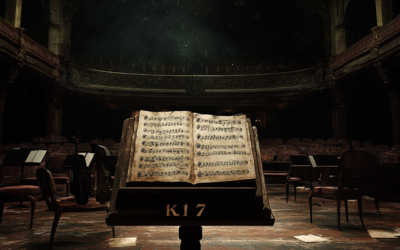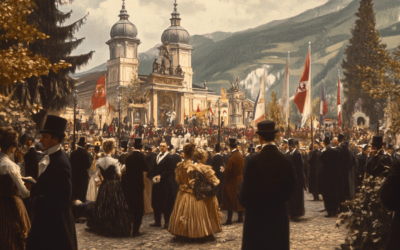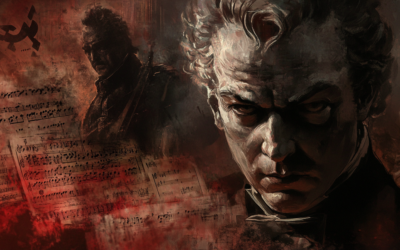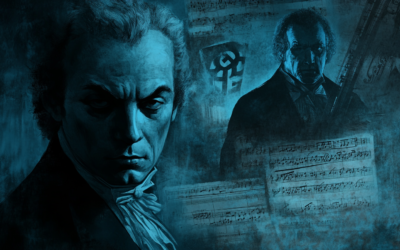Mozart’s Illusory Triumphs
A Tale of Embellishment and Courtly Absence
The story of the young Mozart’s so-called triumphs at the courts of Europe is a tale riddled with embellishments, half-truths, and fabrications—many courtesy of Leopold Mozart himself and those who later sought to mythologize his son. One such example is the visit to Munich on 12 January 1762.
Leopold and Anna Maria brought Wolfgang and his sister, Nannerl, to perform at the court of Prince-Elector Maximilian III. Yet, despite Leopold’s grand descriptions, not a single court document or reliable witness account has surfaced to confirm this celebrated performance.
The biographer Schlichtegroll claims, without evidence, that the Mozarts “performed before the Prince-Elector and received many compliments and praises.” But how much of this can we trust?
Upon their return to Salzburg, Leopold boasted that the children’s harpsichord playing had reached new heights, though no verifiable proof supports these claims either.
Mozart: The Fall of the Gods
This book offers a fresh and critical look at the life of Wolfgang Amadeus Mozart, challenging the myths that have surrounded him for centuries. We strip away the romanticised image of the “natural genius” and delve into the contradictions within Mozart’s extensive biographies. Backed by nearly 2,000 meticulously sourced citations, this work invites readers to explore a deeper, more complex understanding of Mozart. Perfect for those who wish to question the traditional narrative, this biography is a must-read for serious music lovers and historians.
"Documented reality doesn’t always match the fabulous stories passed down by Mozart’s biographers."
Mozart: The Fall of the Gods
The Glass Window Boast in Frankfurt
As the Mozarts embarked on their “grand tour,” Leopold couldn’t resist leaving a boastful mark. At their lodging in Frankfurt, he etched onto a windowpane: “Mozart, Maitre de la Musique de la Chapelle de Salzbourg avec Sa Famille le 12 Aout 1763.” The inscription—claiming a title he did not possess—translates to, “Mozart, Master of the Music Chapel of Salzburg with his family, 12 August 1763.” This self-promotion shows Leopold’s habitual need to exaggerate their importance, raising himself to the rank of Kapellmeister without ever holding that position officially. One might even say it was a compulsive need to dress up reality, ensuring history would remember him more grandly.
Vienna and the Imperial Court: Unimpressed or Ignored?
On 18 September 1762, the Mozart family reached Vienna, aiming to dazzle the imperial court. Schlichtegroll’s account again attempts to paint a picture of prestige. Yet, if we delve deeper, we find that neither Emperor Francis I nor his musicians paid much attention to the Mozart children. The imperial Master of the Chapel and the court musicians seem to have carried on quite unbothered by the young prodigies. Only Empress Maria Theresa, sharp-eyed and ever vigilant, reportedly referred to the Mozarts as “gueux”—that is, “beggars.”
A Fabricated Anecdote to Boost Mozart’s Fame
Desperate to validate this visit, Schlichtegroll concocted yet another fiction, this time at the expense of Georg Christoph Wagenseil, a respected court composer. According to the fanciful tale, Emperor Francis summoned Wagenseil to turn the pages for young Mozart, who had allegedly charmed the sovereign with his musical precocity. The story even features a precocious Wolfgang commanding: “Where is Mr. Wagenseil? He must come; he knows what he’s doing!” Wagenseil then obediently took his place, flipping pages for the child who supposedly performed one of the composer’s own concertos.
Implausibilities and Contradictions
Not only does Schlichtegroll’s account lack coherence, but it also stretches credibility. Are we to believe that Emperor Francis, preoccupied with the pressing concerns of war, granted an audience to a child performing feats such as playing the keyboard blindfolded or with a single finger? Moreover, this narrative conveniently undermines both Wagenseil and the emperor himself, portraying them as incompetent spectators to Mozart’s supposed genius. How convenient for Leopold’s legend.
As we peel back the layers of myth and examine the actual records—or lack thereof—the narrative that emerges is far less extraordinary than Leopold or his biographers would have us believe. In truth, the Mozarts’ encounters with European nobility were often less grand and far more fabricated than history remembers. “To believe the extraordinary,” it seems, “requires extraordinary evidence.” Alas, Leopold’s stories often fall woefully short.
You May Also Like
Constanze Mozart’s Enduring Love
Although some have doubted her devotion, Constanze’s own words and actions illustrate a widow deeply committed to preserving Mozart’s legacy. Diaries, personal correspondence, and eyewitness testimony all challenge the notion that she neglected his memory—while the circumstances around his burial grow ever more perplexing.
A Revealing New Interview on His Thematic Catalogue
We’re excited to present a brand-new interview that challenges many of the long-held assumptions about Mozart’s Thematic Catalogue (1784–1791). Conducted by Swedish journalist Henry Grynnsten, this conversation delves into groundbreaking forensic techniques—like advanced ink analysis and digital image processing—that may change the way we view Mozart’s late works.
The Rattling Symphony: A Critical Take on K. 17
Often attributed to Mozart, the K. 17 symphony is anything but refined. Lacking orchestration and filled with gaps, it raises more questions than answers about its true authorship.
The Hidden Origins of the Salzburg Festival: A Nationalist Dream
The Salzburg Festival, far from being a mere celebration of Mozart’s genius, was born out of nationalist ambitions during a turbulent period in Austro-German history. Conceived by figures like Max Reinhardt, Heinrich Damisch, and Friedrich Gehmacher, the festival was deeply rooted in ultranationalistic ideals, transforming Mozart’s legacy into a tool for cultural dominance. The truth behind its founding has long been obscured, but the primary sources tell a different, darker story.
Mozart, Wagner, and the Nazi Myth
The Führer’s admiration for Wagner’s racially charged ideology not only influenced the policies of the Nazi regime but also reshaped the legacy of Mozart. Under National Socialism, Mozart was not celebrated as a universal genius but as a symbol of German purity and superiority. His music, stripped of its international influence, was rebranded as an expression of Aryan identity, intended to unify and inspire the German people.
Mozart, the Anschluss, and Nazi Propaganda
Following the 1938 Anschluss, the Nazi regime rebranded Mozart as the quintessential German composer, using his image to promote unity between Austria and Germany. The Salzburg Festival became a platform for Nazi propaganda, distorting Mozart’s legacy to fit their nationalistic and racial agenda.







